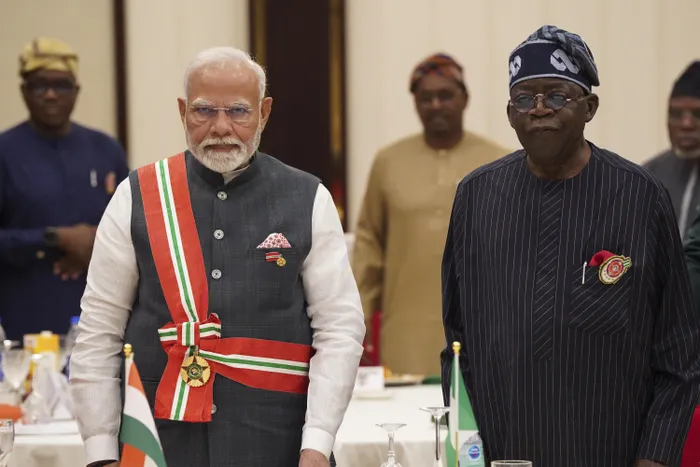BRICS+ Series: Nigeria-India Economic Relationship

India's Prime Minister Narendra Modi (L) and Nigeria's President Bola Tinubu, pose for a photograph as the Indian Prime Minister arrives at the Presidential Palace in Abuja on November 17, 2024, his first stop starting in the Nigeria capital, prior to going to the G20 summit in Brazil, and to Guyana.
Image: AFP
The Nigeria-India relationship exemplifies a successful South-South partnership, moving beyond traditional aid models and towards strategic collaboration. With shared histories, common development challenges, and increasing engagement in platforms like BRICS, the partnership has evolved into a pragmatic and multifaceted one. In 2025, its strength and relevance are built on three key pillars: pharmaceuticals, energy, and capacity-building. This burgeoning relationship highlights the growing influence of the Global South and the potential for impactful partnerships within this context.
Pharmaceuticals: The India-Nigeria Health Bridge
Nigeria, with a population exceeding 220 million, is a major beneficiary of India's pharmaceutical industry, often called the pharmacy of the world. This partnership extends beyond the export of affordable generic drugs; it encompasses access, affordability, and health sovereignty, particularly crucial in the post-pandemic era. Indian pharmaceutical companies like Emzor India and Ranbaxy (now part of Sun Pharma) have made substantial investments in Nigeria, viewing the country not only as a lucrative market but also as a strategic hub for distribution throughout West Africa.
The collaboration between India and Nigeria was especially important during the COVID-19 pandemic. While Western countries hoarded supplies, India provided Nigeria with vaccines and therapeutics through the Vaccine Maitri initiative. Subsequently, the two countries started discussions on collaborative vaccine production, including building local manufacturing capacity. In 2024, Biovac and Indian firm Bharat Biotech began a technology transfer agreement to build a vaccine facility in Lagos, with support from the African Union’s Partnership for African Vaccine Manufacturing (PAVM). If this model is expanded, it has the potential to liberate Africa from its dependence on global pharmaceutical monopolies.
Nigeria's strategic alignment of health and industrial policy advances the African Union's Pharmaceutical Manufacturing Plan for Africa (PMPA). This positions India as a development partner, not a patron, in support of Nigeria's advancement.
Energy: Beyond Oil, Towards Sustainable Transitions
The energy sector, particularly crude oil trade, has always been a cornerstone of the Nigeria-India relationship. India holds the position of Nigeria's largest oil importer, having procured approximately 15% of Nigeria's total crude exports in 2024, with a value exceeding $15 billion. The noteworthy aspect of this partnership lies in its forward-looking approach. As the global energy landscape shifts towards cleaner sources, both nations are proactively reevaluating their energy collaborations.
In 2023, India initiated the Green Hydrogen Mission and offered partnerships to African countries with solar and hydroelectric potential. Nigeria responded by welcoming Indian investment in its untapped renewable energy sector, especially solar and biofuels. Nigeria's Rural Electrification Agency and Indian firm Sterling and Wilson Solar partnered to install solar mini-grids in northern Nigeria to address the acute energy poverty in the region.
The cooperation between India and Nigeria extends to skills transfer in the oil and gas sector. Through the Indian Technical and Economic Cooperation (ITEC) program's South-South scholarship scheme, the Indian Oil Corporation has provided training to Nigerian engineers and geologists. This is crucial as Nigeria aims to enhance the value derived from its hydrocarbons through domestic refining and downstream processing.
Capacity-Building and Knowledge Diplomacy
India's commitment to soft power is exemplified by its capacity-building initiatives in Nigeria. Over the past five years, India has utilised the Indian Technical and Economic Cooperation (ITEC) program to train over 1,000 Nigerian professionals in various sectors, including civil service, engineering, IT, and healthcare.
Furthermore, India expanded its Digital India for Africa initiative in 2024 to include coding bootcamps, AI and robotics training, and cybersecurity workshops for Nigerian youth. In a move to promote digital literacy, cybersecurity, and fintech integration, Nigeria's National Information Technology Development Agency (NITDA) signed an MoU with India's Ministry of Electronics and IT. This collaboration is crucial given the rapid growth of Nigeria's fintech sector and its need for domestic technical expertise.
Additionally, academic partnerships between Indian and Nigerian universities are being established, with a focus on mutual benefit, cultural affinity, and strategic development. These exchanges mark a departure from traditional Western scholarships and emphasis a more balanced and collaborative approach to knowledge sharing and development.
Conclusion: From Transactional Trade to Strategic Sovereignty
The economic relationship between Nigeria and India stands out not solely due to the trade volume or investment scope, but because of the shared goal of establishing independent capacities in health, energy, and knowledge sectors. This relationship is based on mutual respect, free from neocolonial undertones, and aligns with the broader vision of a fair global order.
As BRICS+ develops and the Global South enhances its bargaining power, Nigeria and India are likely to become key players in a new developmental model—one that is practical, equitable, and forward-looking.
Written By:
*Dr Iqbal Survé
Past chairman of the BRICS Business Council and co-chairman of the BRICS Media Forum and the BRNN
*Sesona Mdlokovana
Associate at BRICS+ Consulting Group
UAE & African Specialist
**The Views expressed do not necessarily reflect the views of Independent Media or IOL.
Related Topics: